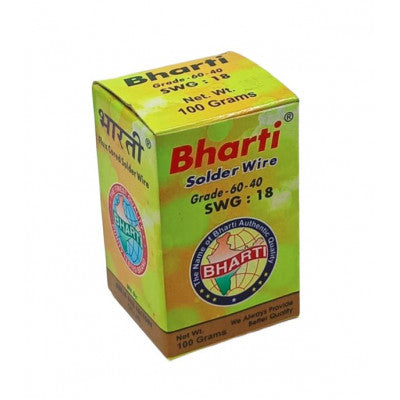
Bharti 100gm 18 Gauge Flux Cored 60/40 Grade Solder Wire
Commonly used in electronics, lighting, communication, radio, computer, instruments, and other fields.
- Inclusions: Solder Wire
- SWG: 18
- Grade: 60-40
- Weight: 100gm
Features:
- Halide-free solder wire, suitable for repair operations
- Fast melting, good wetting, and expansibility
- No break for the core, no splash, and no odor
- Good solderability and soldering joints with high brightness and strength
Lead Solder: Tin/Lead solders, also called soft solders, are commercially available with tin concentrations between 5% and 70% by weight. The greater the tin concentration, the greater the solder’s tensile and shear strength. Alloys commonly used for electrical soldering are 60/40 Tin/Lead (Sn/Pb) which melts at 370 °F or 188 °C and 63/37 Sn/Pb used principally in electrical/electronic work. The 63/37 is a eutectic alloy.
Lead-Free Solder: Lead-free solders in commercial use may contain tin, copper, silver, bismuth, indium, zinc, antimony, and traces of other metals. Most lead-free replacements for conventional Sn60/Pb40 and Sn63/Pb37 solder have melting points from 5 to 20 °C higher though solders with much lower melting points are available.
Flux-Core Solder: Flux is a reducing agent designed to help reduce (return oxidized metals to their metallic state) metal oxides at the points of contact to improve the electrical connection and mechanical strength. The two principal types of flux are acid flux, used for metal mending and plumbing, and rosin flux, used in electronics, where the corrosiveness of acid flux and vapors released when solder is heated would risk damaging delicate circuitry.
Hard Solder: Hard solders are used for brazing and melt at higher temperatures. Alloys of copper with either zinc or silver are the most common.
The residue is easy to remove by hot air after soldering work if necessary. Available in many alloy compositions, other alloy compositions are also available.
* Images are for illustration only; actual product may vary.

